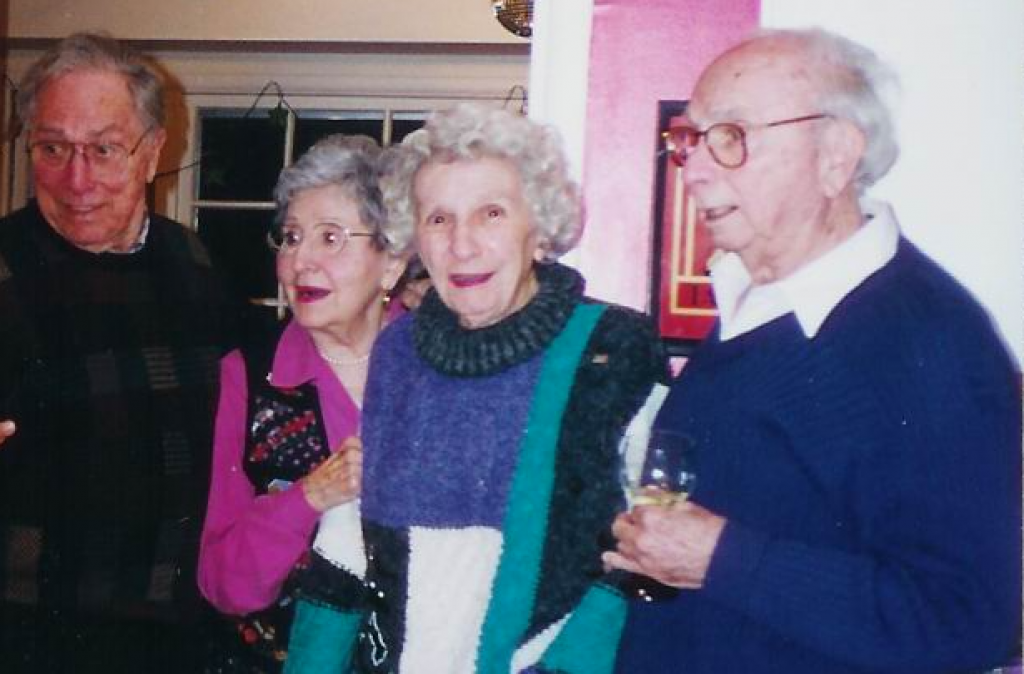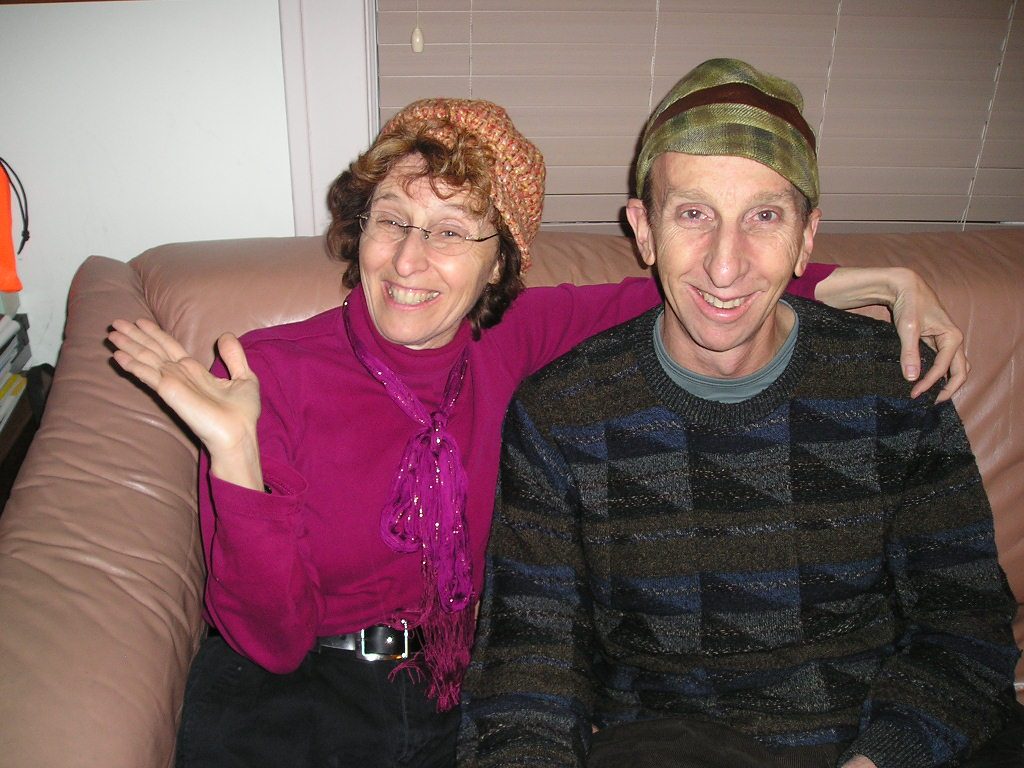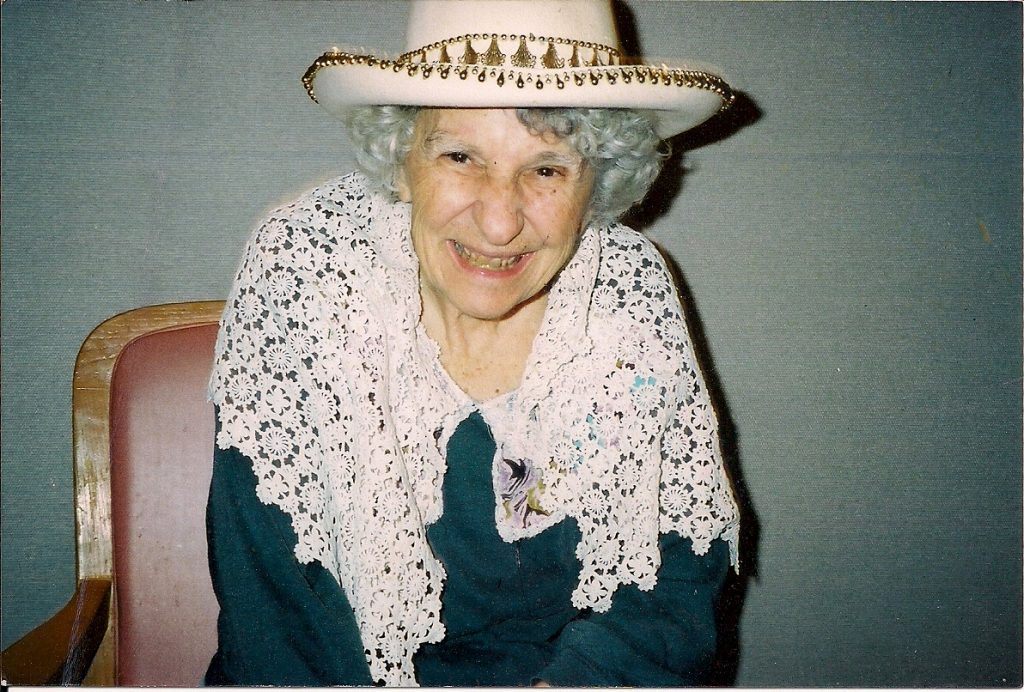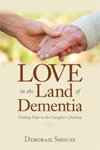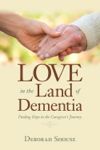love
Five Ways to Make Valentine’s Day Special for a Loved One Living with Dementia
My parents liked to celebrate Valentine’s Day with dinner and dancing. Years into my mom’s Alzheimer’s journey, my parents’ love hadn’t diminished, but my mom’s capacity for going out to dinner and dancing had drastically decreased. I saw how blue my father was—one more event he had to give up, one more change in the woman he loved—and I searched for alternatives that might cheer him up. Here are five ways to make Valentine’s Day special.
Look for a favorite thing. Seek one simple pleasure your loved one might enjoy. Mom loved potato soup and chocolate and fresh strawberries. These were part of our celebration.
Nurture yourself: include your own favorite thing. Bring yourself into the celebration and include something that makes you happy. I brought foods my father and I both liked as part of our little party.
Pick several ways to express your love. Poetry, music, gifts, flowers, and photo albums—you can use any of these resources as a catalyst to talk about your feelings. Dad and I sang Mom old show tunes and love songs, music she really enjoyed. Mom adored Shakespeare; we had a couple of sonnets on hand. She and Dad had once created a beautiful flower garden; Dad brought her a single red rose.
Take joy in the simple act of expressing yourself. Being with my mom was a chance to really practice the mythical “unconditional love.” Mom couldn’t tell me she loved me. During one Valentine’s Day celebration, she fell asleep while I was holding her hand and talking sweetly to her. But there was a comfort in expressing my love and I kept on talking.
Celebrate love in all its glorious guises. During their long marriage, my father had walked into a room millions of times and often, Mom had been busy and hadn’t particularly smiled or remarked. But with her dementia came a deep dependency on Dad. When Dad walked into a room, my mother’s face lit up. My father basked in that light. The sparkle in my mother’s eyes was the new, “I love you, darling.” The light said everything my mother could no longer say.
Deborah Shouse is the author of Connecting in the Land of Dementia: Creative Activities to Explore Together and Love in the Land of Dementia: Finding Hope in the Caregiver’s Journey.
A Thanksgiving Love Story: Bringing Home the Gravy
Thanksgiving changed the year I went vegetarian. I did not mind giving up the tender, moist turkey or the savory oyster-specked stuffing. But giving up the flavorful flow of mushroom-laden gravy was quite another thing. I watched enviously as my family ladled the luscious liquids over their mashed potatoes, turkey and stuffing. As I nibbled dryly on my carrots, green beans and salad, my lower lip protruded. I felt left out and deprived.
My brother, Dan, ever alert to the pouting big sister, came up with a solution.
“Next year I will make special vegetarian gravy just for you,” Dan promised.
Years later, that special vegetarian gravy has become one of my favorite Thanksgiving rituals. I begin fantasizing about it the moment the autumn leaves turn crimson. I know that in mere weeks, my brother and his family will arrive and I will have my yearly boost of family and feasting, highlighted by gravy.
When my brother calls to tell me his travel plans, I write his arrival time and GRAVY on my calendar. The night he comes to town, we make the shopping list together, avidly discussing how many pounds of mushrooms we need for both the carnivore and vegetarian pots of gravy. I relish the early-Wednesday morning trip through the grocery store, where Dan and I and our children carefully select the foods we will be making the next day. We linger in the produce aisle, filling several sacks with gleaming white mushrooms and buying rustling yellow onions.
On Thanksgiving Day, Dan and I and other family members spend long, luxurious hours cooking. Dan mans the stove and I manage the slicing and chopping. Together we snap, peal, slice and dice the vegetables that will accessorize the turkey. I take special pleasure in wiping clean and slicing the mushrooms, then bringing my brother the brimming bowlful. When he has nodded his approval, I get out the old copper pot I bought in Germany in the early seventies. This year, Dan is improving his already amazing gravy. With his new immersion blender, he creates a rich base of caramelized onions, whose flavor surpasses that of the lowly vegetable cube. He adds in a little flour, then gentles the mushrooms into the onion broth. When the pot is bubbling with thickening nectar, he says, “Taste this and see what you think.”
I always think the same thing—“Wow, this is great.”
We are in a state of giddy and satisfied exhaustion by the time our guests arrive. We share grateful prayers with everyone and lay out the feast, including plenty of turkey-based gravy for the rest of the family.
Then comes the moment I have been waiting for: I sit down, my own personal pot of gravy poised by my plate. I cover the mashed potatoes, carrots, green beans, and salad with the aromatic concoction and I savor every bite. But more importantly, I savor the bounty, creativity, and love that have gone into this simple dish. Through this gravy, my brother speaks with his hands and his heart, saying: “I care about you and I am going to make sure you are not left out and that you have something fantastic to eat.”
For that and so much more, I am thankful.
…………
And now, if you’d like to create a Thanksgiving love story, bring home this delicious gravy.
Dan Barnett’s Chicago Style Never-Enough-Mushroom Vegetarian Gravy
Ingredients
2 large onions (chopped)
2 pounds (or more) white button mushrooms sliced (can add some portabellas for enhanced flavor)
1 cup of white wine (of lesser quality)
Salt & pepper to taste
2 tablespoons of cornstarch
Olive oil
For 5 cups of water, start out with 2 vegetable boullion cubes. Add more if needed.
Directions
To create the gravy base:
In a four-quart pot, pour a thin layer of olive oil and turn the burner on medium.
Add the onions and sauté for10-15 minutes until they are caramelized (golden brown)
Add water until the pot is about half full.
Simmer slowly for 30 minutes.
Blend the onion water mixture using either an immersion blender or by transferring the mixture to a food processor.
Add the 2 pounds (or more) of sliced mushrooms white wine and fill the pot with water until it is 3/4 full. Simmer for 15-20 minutes.
In a small bowl, put 2 tablespoons of cornstarch. Pour in a small amount of the broth. Once it’s a smooth paste, pour in more liquid to make it a runny paste. Then pour the mixture slowly back into the gravy while stirring. This will thicken it. You may have to do this a couple of times to achieve the desired thickness.
Simmer for 30 minutes and season to taste with salt and pepper.
###
Deborah Shouse is the author of Connecting in the Land of Dementia: Creative Activities to Explore Together and Love in the Land of Dementia: Finding Hope in the Caregiver’s Journey.
Celebrating our Mothers
If my mother were still alive, I would be taking her roses and chocolate this Mother’s Day. She would be delighted and her delight would magnify when my daughters and her great-grandchildren arrived. Love is such a beautiful glue, such a simple and strong way to stay connected. I wanted to share this story from Love in the Land of Dementia, as a way of celebrating our mothers.
The Woman She Was
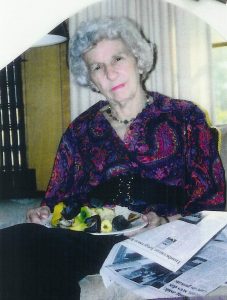 My friend Karen gives me a gift: she says, “Tell me about your mother.”
My friend Karen gives me a gift: she says, “Tell me about your mother.”
We are sitting in a quiet mid-afternoon café and I let the question sink into me.
When friends occasionally ask me, “How is your mother doing?” I have different answers, depending on the situation. If we are in one of those conversations that are like confetti in brisk wind, I say, “She’s okay.”
If we are sitting across from each other and my friend is looking right at me, I answer, “She’s pretty deep into Alzheimer’s.”
“Does she recognize you?” she might ask.
“No, but she may recognize I am a person she likes,” I answer.
That usually ends that conversation.
But “Tell me about your mother,” is an invitation I don’t usually get.
“What would you like to know?” I ask.
She stirs her iced mocha. “Whatever you want to tell me,” she says softly. “I would like to know about her life and her interests.”
Since my mother has been in the nursing home with Alzheimer’s, I have seldom talked about the person she used to be. Occasionally my father and I reminisce about family vacations and outings. I sometimes ask Dad questions about our growing up days and the early days of their courtship. But I rarely think about the woman I knew all my life, the mother, grandmother, artist, gardener, compassionate friend, avid reader, bird-watcher, early morning walker, lemon-meringue pie baker. That woman is gone and I have spent a lot of energy learning to know and appreciate the woman who now commandeers her body.
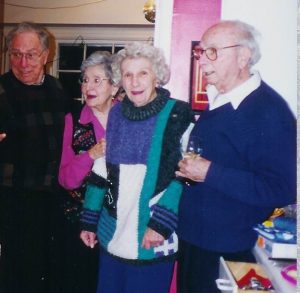 As I consider what I want to tell Karen, I remember visiting my mom’s best friend, Bel, in California when I was a teenager. Bel, who was spunky and adventurous in a way that seemed so different from my conservative mother, drove me from Berkeley to the small resort where I would work as a chambermaid for the summer.
As I consider what I want to tell Karen, I remember visiting my mom’s best friend, Bel, in California when I was a teenager. Bel, who was spunky and adventurous in a way that seemed so different from my conservative mother, drove me from Berkeley to the small resort where I would work as a chambermaid for the summer.
“Do you know how I met your mom?” she asked me, as we drove down the winding roads, past fragrant stands of eucalyptus trees.
“In Iceland, during the World War II,” I said. I had heard stories of the two of them taking a break from their work in the hospital by skiing, then stopping for a soak in a hot springs.
“No, we met earlier in Chicago. We were both nurses working the twelve-hour night shift. The hospital had a room with a couple of bunk beds so we could rest on breaks. One night I walked in there and heard the most heart-breaking sobbing. It was Frances, crying her eyes out. I asked her what was wrong and she said, ‘Nothing.’”
I smiled. That sounded like Mom, never wanting to admit anything was wrong.
“Then I asked her again and she sobbed out that her husband Sam had died six months ago from pneumonia. She was so sad she didn’t know if she could go on. A bunch of other nurses and I were going to Florida for a short vacation and I persuaded your mother to join us. But as it turned out, we never went; a week later I decided to join the Army and I encouraged her to come along. We’ve been best friends ever since.”
When I heard this story at the age of seventeen, I was too young to fathom my mother’s grief and despair. By the time I told Karen the story, I had some sense of what my mother must have gone through.
“Your Mom was really brave, to serve in the Army during wartime,” Karen says.
I feel a little swell of pride. Mom’s tales of traveling in the darkest night on the troop ship, with bombs falling nearby, were so familiar I had never considered her bravery and courage.
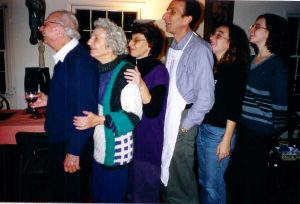 Now I tell Karen how my father, encouraged by Bel’s husband, wrote Mom a letter, telling her he was ready to marry a nice Jewish girl. Was she interested? Was she available?
Now I tell Karen how my father, encouraged by Bel’s husband, wrote Mom a letter, telling her he was ready to marry a nice Jewish girl. Was she interested? Was she available?
After some correspondence, Mom surprised herself by agreeing to meet him in Chicago. At the end of the week, my father asked her to marry him. She considered the offer for three weeks and accepted. Their whirlwind romance was fueled by practicality.
“What a great story,” Karen says. “Your mother must be an amazing woman.”
Sparked by Karen’s interest, I let myself feel my love for my mother as she used to be. I am in tears by the time our conversation ends.
“Thank you for asking me about my mother,” I say to Karen.
“Your stories make me want to call my own mom and hear her stories again.”
As I drive home, I think of more “mom” stories to share with my children and my brother. I see myself, along with my brother and father, as the carrier of my mother’s sacred legacy. I imagine myself tenderly fanning the embers, adding dry leaves and crumbled paper, creating a blaze with each memory. I realize I don’t have to give up Mom’s old self: I can be her historian and her scribe, carrying her stories with me, and making sure they live on.
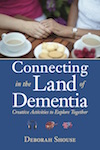
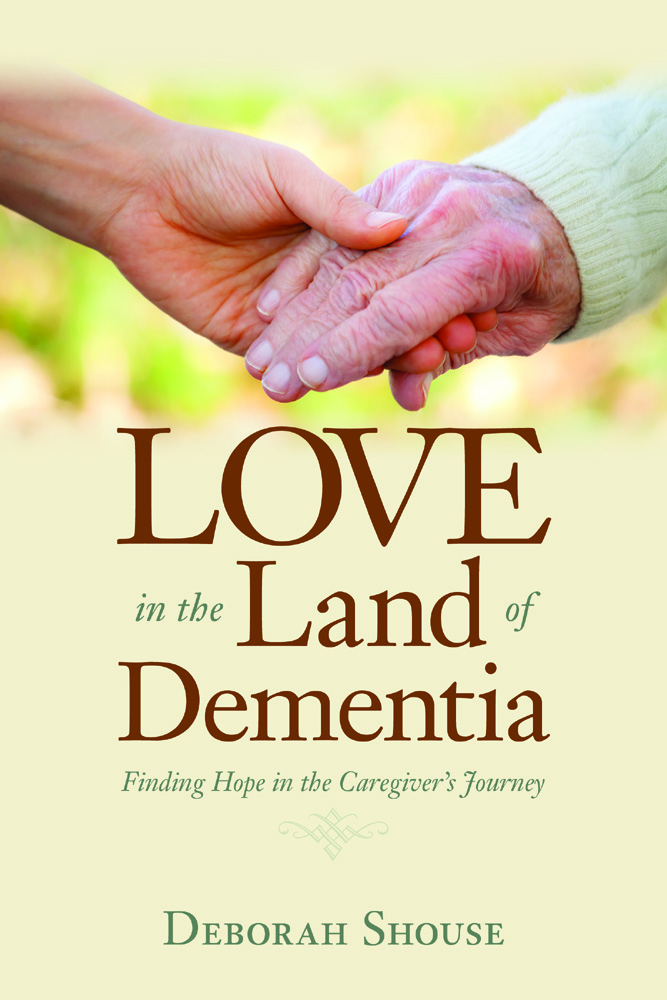
A Thanksgiving Love Story: Bringing Home the Gravy
Thanksgiving changed the year I went vegetarian. I did not mind giving up the tender, moist turkey or the savory oyster-specked stuffing. But giving up the flavorful flow of mushroom-laden gravy was quite another thing. I watched enviously as my family ladled the luscious liquids over their mashed potatoes, turkey and stuffing. As I nibbled dryly on my carrots, green beans and salad, my lower lip protruded. I felt left out and deprived.
My brother, Dan, ever alert to the pouting big sister, came up with a solution.
“Next year I will make special vegetarian gravy just for you,” Dan promised.
Years later, that special vegetarian gravy has become one of my favorite Thanksgiving rituals. I begin fantasizing about it the moment the autumn leaves turn crimson. I know that in mere weeks, my brother and his family will arrive and I will have my yearly boost of family and feasting,
When my brother calls to tell me his travel plans, I write his arrival time and GRAVY on my calendar. The night he comes to town, we make the shopping list together, avidly discussing how many pounds of mushrooms we need for both the carnivore and vegetarian pots of gravy. I relish the early-Wednesday morning trip through the grocery store, where Dan and I and our children carefully select the foods we will be making the next day. We linger in the produce aisle, filling several sacks with gleaming white mushrooms and buying rustling yellow onions.
On Thanksgiving Day, Dan and I and other family members spend long, luxurious hours cooking. Dan mans the stove and I manage the slicing and chopping. Together we snap, peal, slice and dice the vegetables that will accessorize the turkey. I take special pleasure in wiping clean and slicing the mushrooms, then bringing my brother the brimming bowlful. When he has nodded his approval, I get out the old copper pot I bought in Germany in the early seventies. This year, Dan is improving his already amazing gravy. With his new immersion blender, he creates a rich base of caramelized onions, whose flavor surpasses that of the lowly vegetable cube. He adds in a little flour, then gentles the mushrooms into the onion broth. When the pot is bubbling with thickening nectar, he says, “Taste this and see what you think.”
I always think the same thing—“Wow, this is great.”
We are in a state of giddy and satisfied exhaustion by the time our guests arrive. We share grateful prayers with everyone and lay out the feast, including plenty of turkey-based gravy for the rest of the family.
Then comes the moment I have been waiting for: I sit down, my own personal pot of gravy poised by my plate. I cover the mashed potatoes, carrots, green beans, and salad with the aromatic concoction and I savor every bite. But more importantly, I savor the bounty, creativity, and love that have gone into this simple dish. Through this gravy, my brother speaks with his hands and his heart, saying: “I care about you and I am going to make sure you are not left out and that you have something fantastic to eat.”
For that and so much more, I am thankful.
…………
And now, if you’d like to create a Thanksgiving love story, bring home this delicious gravy.
Dan Barnett’s Chicago Style Never-Enough-Mushroom Vegetarian Gravy
Ingredients
2 large onions (chopped)
2 pounds (or more) white button mushrooms sliced (can add some portabellas for enhanced flavor)
1 cup of white wine (of lesser quality)
Salt & pepper to taste
Olive oil
Directions
To create the gravy base:
In a four -quart pot, pour a thin layer of olive oil and turn the burner on medium.
Add the onions and sauté for10-15 minutes until they are caramelized (golden brown)
Add water until the pot is about half full.
Simmer slowly for 30 minutes.
Blend the onion water mixture using either an immersion blender or by transferring the mixture to a food processor.
Once you have the gravy base
Add the 2 pounds (or more) of sliced mushrooms, white wine and fill the pot with water until it is 3/4 full.
Simmer for 30 minutes and season to taste with salt and pepper.
Deborah Shouse is the author of Connecting in the Land of Dementia: Creative Activities to Explore Together and Love in the Land of Dementia: Finding Hope in the Caregiver’s Journey.
The Marvels of Misplacing
“I don’t know where my glasses are,” Mom tells me. I bite my lip; she’s been misplacing things all day. We are supposed to be spending a day drawing and painting, trying to connect mom with the artist she used to be. We are supposed to bake cookies together and look through magazines. But I’ve been spending much of the time crawling around, looking under the sofa and chairs and between the cushions for the disappearing glasses.
“Let’s make our cookies. You won’t need your glasses for that,” I say.
“I need my glasses.”
As I search, I wonder when it became a drudgery instead of a joy to find things. One of my favorite childhood games was Hide ‘N Seek. I loved being the Seeker, loved the surprise of finding someone in a tucked away, mysterious place. I had a special trick I used when I was “It.” I would close my eyes and say, “If I were Dan, where would I hide?” Then an image floated into my mind and I’d race to the hiding place. Half the time, I was right.
Do I still have “it?” I close my eyes and think, “If I were Mom’s glasses, where would I be?” The refrigerator comes to my mind. I rush into the kitchen and fling open the refrigerator door, only to see the usual chaos. But I’m hungry, so I reach for an apple. Behind the fruit is a pair of reading glasses, sprawled across the shelf.
Triumphantly, I take the glasses to Mom.
“These feel nice,” she says.
Not only has my mother reminded me of the importance of creativity, curiosity and play, but she also discovered a great summer time tip: chill your glasses and cool off your face.
Deborah Shouse is the author of Connecting in the Land of Dementia: Creative Activities to Explore Together and Love in the Land of Dementia: Finding Hope in the Caregiver’s Journey.
An Insider’s Look at True Love: Charlie and Elizabeth’s Story
For years, I interviewed fascinating couples every week for a column in the Kansas City Star. Talking to people who are in love is always inspiring; often couples have to overcome enormous obstacles to bring their relationship into reality. One of my favorite stories stars two friends whose love and cosmic connection shines out from their faces and rings out with their words. Here is an short version of their beautiful story, an insider’s look at true love.
**
The coffee date was going better than Charlie, age 60, could have ever imagined. Just a month earlier, his best friend had burst into Charlie’s dark apartment and roused Charlie from his lethargy, saying, “You need to open up these windows and let some light in. You should start dating.”
“Who would go out with a guy who has Early Onset Alzheimer’s?” Charlie asked his friend.
“Maybe you should find out,” his friend replied.
So Charlie Miller pried himself out of his depression and joined eHarmony. And this coffee date with Elizabeth Hack was the result.
Elizabeth, age 55, was brilliant, interesting, energetic, curious, and shared many of Charlie’s interests. When she asked Charlie what he liked to do, he mentioned listening to music, attending theater, visiting with friends and volunteering for the Alzheimer’s Association.
Elizabeth knew nothing about Alzheimer’s. She asked, “Does someone close to you have the disease?”
“Yes,” Charlie answered. He wanted to say more but the words stuck in his throat. He had never envisioned this casual meeting could possibly turn into a romance. Yet he was already comfortable with Elizabeth and felt their relationship was meant to be.
Over the weeks, they continued seeing each other, meeting at concerts, going to plays, and exploring new restaurants. As their friendship deepened. Charlie knew he had to share his diagnosis with Elizabeth and he worried she wouldn’t be able to accept it.
But before he had a chance to broach the subject, Elizabeth, wanting to learn more about Alzheimer’s and about Charlie’s interests, visited the local Alzheimer’s Association website and noticed a picture of Charlie, as a volunteer and a person who has Alzheimer’s. She was shocked, dismayed, and confused. But she was also in love with Charlie; his diagnosis did not diminish her deep feelings for him.
 Charlie suggested she meet with his social worker at the Association to learn more about the disease. Elizabeth did that and though the information was daunting, her connection with Charlie was strong and true; she, too, felt they were destined to be together.
Charlie suggested she meet with his social worker at the Association to learn more about the disease. Elizabeth did that and though the information was daunting, her connection with Charlie was strong and true; she, too, felt they were destined to be together.
They began traveling and made plans to move in together. In a vineyard restaurant in Napa Valley, Charlie proposed and Elizabeth said Yes. Today, they are living happily, grateful they have found each other
“None of us know what will happen next,” Elizabeth says. “Just the other night, we were at a dinner party. One friend was just released from the hospital after heart surgery, and another friend was facing a hip replacement. I felt concerned for my friends and I felt so lucky that Charlie and I were happy and together. We are dedicated to living with joy and curiosity in the present moment.” 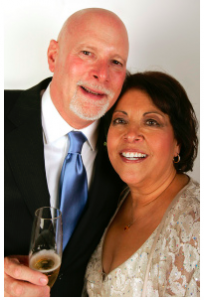
Deborah Shouse is the author of Connecting in the Land of Dementia: Creative Activities to Explore Together and Love in the Land of Dementia: Finding Hope in the Caregiver’s Journey.
Five Ways to Make Valentine’s Day Special for a Loved One with Dementia
My parents liked to celebrate Valentine’s Day with dinner and dancing. Years into my mom’s Alzheimer’s journey, my parents’ love hadn’t diminished, but my mom’s capacity for going out to dinner and dancing had drastically decreased. I saw how blue my father was—one more event he had to give up, one more change in the woman he loved—and I searched for alternatives that might cheer him up. Here are five ways to make Valentine’s Day special.
Look for a favorite thing. Seek one simple pleasure your loved one might enjoy. Mom loved potato soup and chocolate and fresh strawberries. These were part of our celebration.
Nurture yourself: include your own favorite thing. Bring yourself into the celebration and include something that makes you happy. I brought foods my father and I both liked as part of our little party.
Pick several ways to express your love. Poetry, music, gifts, flowers, and photo albums—you can use any of these resources as a catalyst to talk about your feelings. Dad and I sang Mom old show tunes and love songs, music she really enjoyed. Mom adored Shakespeare; we had a couple of sonnets on hand. She and Dad had once created a beautiful flower garden; Dad brought her a single red rose.
Take joy in the simple act of expressing yourself. Being with my mom was a chance to really practice the mythical “unconditional love.” Mom couldn’t tell me she loved me. During one Valentine’s Day celebration, she fell asleep while I was holding her hand and talking sweetly to her. But there was a comfort in expressing my love and I kept on talking.
Celebrate love in all its glorious guises. During their long marriage, my father had walked into a room millions of times and often, Mom had been busy and hadn’t particularly smiled or remarked. But with her dementia came a deep dependency on Dad. When Dad walked into a room, my mother’s face lit up. My father basked in that light. The sparkle in my mother’s eyes was the new, “I love you, darling.” The light said everything my mother could no longer say.
Deborah Shouse is the author of Connecting in the Land of Dementia: Creative Activities to Explore Together and Love in the Land of Dementia: Finding Hope in the Caregiver’s Journey.
Five Secrets For Making Date Night Great
I caught up with Nettie Harper and Kelly Gilligan, co-founders of Inspired Memory Care, Inc. as they were rushing down the streets of Manhattan, off to consult with a client. I loved hearing the city sounds, horns honking, cars edging past, a lone dog barking, as they shared their five secrets for making date night great. (I have changed the names in this story to protect people’s privacy.)
During my mother’s journey through dementia, my father was always seeking ways to stay connected with her. He would have loved the ideas in this article.
Five Secrets For Making Date Night Great!
Margaret slipped on a string of pearls and surveyed herself in the bathroom mirror. Her royal blue silk dress, one that her husband Harold had bought her for their 40th wedding anniversary, still looked good. She fingered her hair nervously and hoped this evening would go well. Their last weekly dinner date had been a disaster. Harold had felt uncomfortable in the restaurant, even though they’d chosen it together. He picked at his food and barely spoke a word. Margaret had to hold back tears as she looked around the brightly lit room and envied all the happy couples and families, laughing, talking, and savoring their food.
Tonight, she vowed, would be different. Tonight, she was prepared, coached by Nettie Harper and Kelly Gilligan of Inspired Memory Care, Inc, in Manhattan, NY.
She’d chosen a quiet restaurant and reserved a cozy corner table, away from the bustle. Harold’s face tightened as they strolled in, but she took his hand and he squeezed hers. After they settled into their seats and ordered their meal, the dreaded silence descended. She was about to say, “Do you remember the time we took my cousin from England out to dinner…?” but she bit her lip. Harold’s eyes went blank when she prodded him for specific memories.
Instead, Margaret unfolded an article on sailing, one of Harold’s passions, and offered it to him. “Could we read this together?” she asked. The large print made it easy to see and Harold began reading aloud, weaving in the open-ended questions Nettie and Kelly had written in for them to discuss.
“What does this make you think of?” he read, after a few moments.
“The sea,” Harold said.
Margaret took a turn reading aloud, and Harold leaned forward a little.
“Would you ever go out on such stormy seas?” she asked.
“If I felt strong I might,” Harold said. “I always liked sailing with you. Remember that time with the snow and the animals? Those big fish?”
Margaret smiled and took Harold’s hand.
“That was our whale watching cruise. I do remember. I really liked the penguins.”
“What did I like?” Harold asked.
“The glaciers,” she said. “And the dancing.”
In their work, Nettie and Kelly often coach care partners like Margaret, offering creative ways to stay connected with loved ones who are living with dementia. Their idea of bringing along an article on one of Harold’s favorite topics transformed the dinner into a time of wonderful sharing. On future date nights, Margaret continued to bring along articles on topics of great interest, as conversation starters.
Nettie and Kelly’s company, Inspired Memory Care, Inc. (IMC), is founded on the belief that older adults, both with and without memory impairment, should have access to life-enriching, esteem-building experiences, sharing their wisdom and pursuing their passions each day.
“We encourage couples and families to commit to rituals and set aside time together, just like you would without a memory impairment,” says Nettie. “Date night is an important part of the week, a chance to do something special and unique.”
“We coach people to ask open-ended questions, such as, ‘Would you rather..’ “Would you ever…’ ‘Tell me more about…’” Kelly says.
“‘Tell me more” is one of the strongest questions you can ask. Frequently words come flooding out.
After posing an open-ended question, they encourage care partners to wait, allow silence, and give people a chance to respond.
“If we jump in and give the answer, we’re taking away the strength of the individual,” they believe.
So what are the five secrets to a successful date night?
- Bring a conversational catalyst, such as an interesting article to discuss.
- Ask open-ended questions.
- Wait lovingly for the answers.
- Meet people where they are.
- Celebrate your time together.
Use these five secrets for making date night great and create a meaningful and connective atmosphere — for any couple or family — regardless of cognitive abilities!
Deborah Shouse is the author of Connecting in the Land of Dementia: Creative Activities to Explore Together and Love in the Land of Dementia: Finding Hope in the Caregiver’s Journey.
Expanding My Definition of Love
Love comes in so many magical guises. My journey with people who have Alzheimer’s has expanded and deepened my understanding of love. Here are some insights from others.
My friend Vicki always inspires and teaches me. She has early onset Alzheimer’s and her outlook is an embodiment of grace and spirit. She writes: “I have lost both friends and family members since I have dementia. Some people are just so uncomfortable that they just cannot bear to see me go down hill. I have lost a very good friend who just can’t seem to handle it. I know that these people love me but they do not have the emotional fortitude to see the daily loss. You will find out who really loves you when you get dementia because these are the people who will be there for you when you need them.” — Vicki Stoecklin, Kansas City, Mo, retired designer
The True Meaning of Unconditional Love
Linda Fisher is a tireless advocate and a caring person. Her words really move me. “Caring for my husband Jim taught me the true meaning of unconditional love. I became fiercely protective of him and learned to love him ‘as is’ without looking back on the man he had been or forward to the man he would become. My love for him continued to grow throughout the ten years of his dementia, as he became dependent on me to be his advocate in all aspects.” — Linda Fisher, Sedalia, Mo, retired office manager, Central Missouri Electric Coop http://earlyonset.blogspot.com Early Onset Alzheimer’s: My Recollections, Our Memories (2012)
The Full Range of Emotions
Kelly Sheet, founder of the SpunkyCaregiver, offered these deep insights: “I have learned that love transcends any words and appearances. When someone has dementia, love is shared through energy and feeling. You can be vulnerable with people who are living with dementia. And it is a relief to be so open. Day-to-day we are expending energy to protect ourselves from saying too much or too little or the wrong thing. The great gift of loving people with dementia is that you can let go of those ideas, experiment with what a full range of emotions actually feels like. Without being judged, you can laugh spontaneously at some goofy moment, dance with abandon or hold hands with a stranger. Loving people with dementia helps me to feel alive. The hundreds of seniors I have known over the years have really taught me how to love more freely.” — Kelly Sheets, Founder, Sisters, Or, www.TheSpunkyCaregiver.com,
Every person teaches us more about love.
Deborah is the author of Love in the Land of Dementia: Finding Hope in the Caregiver’s Journey.
Learning about Love through the Dementia Journey
This month, I’ve been asking myself and others, What have you learned about love from your dementia journey? Here are some of the profound answers:
I learned that it is redefined. I loved my mother as my parent, and then learned to love her as a child. And I would not trade that experience for anything. Pamela J. Van Ahn, Executive Director at Caring Together in Hope, Inc., Atlanta, GA
I have learned that love remains, even as memory fails. Long after your name is forgotten, there are still frequent glimpses of recognition that are very meaningful. The Alzheimer’s patient does not become “a different person”. They are much more “still there” than easily meets the eye. With Alzheimer’s disease, things that have emotional context are remembered the longest, and love is a strong emotion. Max Wallack, research intern in the Molecular Psychiatry in Aging Laboratory at Boston University School of Medicine, Boston MA.
I have learned so many lessons regarding love through my mothers journey with dementia. Here are just a couple of them. There are multiple levels of unconditional love. Each one is more precious and runs deeper then the next. “Letting Go” of our need to control is one of the most loving things we can do for a person with dementia and ourselves. Allowing a person with dementia to be in a loving respectful relationship, even if it might be with someone unexpected, is a gift to all and does not mean they love us less. Love runs much deeper than a name. We need to stop quizzing a person with dementia to check if they know and love us. A name has nothing to do with the bond and connection between two souls. Lori La Bey, Founder of Alzheimer’s Speaks , St. Paul, Minnesota, www.AlzheimersSpeaks.com
Deborah is the author of Love in the Land of Dementia: Finding Hope in the Caregiver’s Journey.
